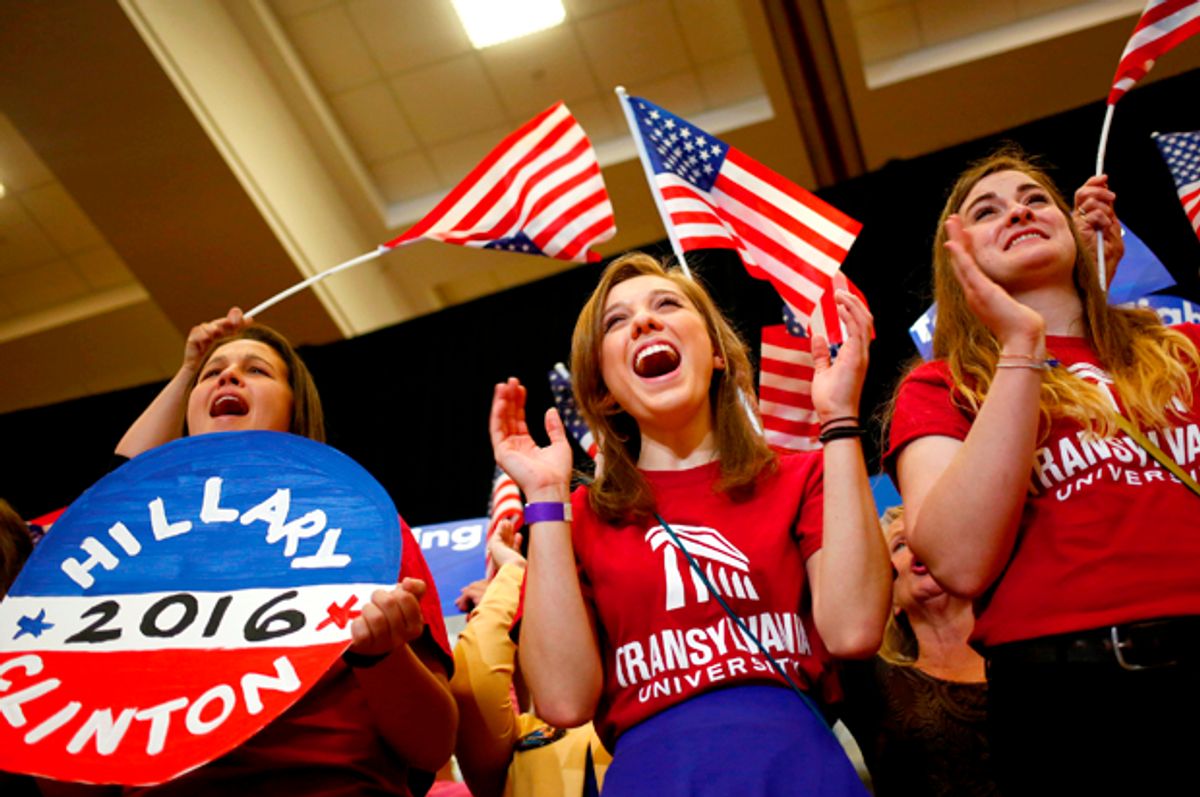It may have seemed odd to believe that Hillary Clinton would ever be perceived as weak. She has a reputation for hawkishness and a long history of gritty forbearance in the face of attacks from the both the press and the Republicans. But ironically, the data showed that if Clinton were to have a problem with national security and foreign policy it would likely come as much from women as from men.
I drew heavily from this piece by nationals security expert Heather Hurlburt in The American Prospect who wrote:
The majority of voters express equal confidence in men and women as leaders, but when national security is the issue, confidence in women’s leadership declines. In a Pew poll in January [2015], 37 percent of the respondents said that men do better than women in dealing with national security, while 56 percent said gender makes no difference. That was an improvement from decades past, but sobering when compared to the 73 percent who say gender is irrelevant to leadership on economic issues...
The terrorist attacks of the past year in Europe and at home could have been expected to grow those numbers:
Gender politics magnify the electoral effects of anxiety in two ways. First, in surveys and other studies, women consistently report higher levels of anxiety. In fact, women poll twice as anxious as men, largely independent of the specific topic. Women are more concerned about security, physical and economic, than men. According to Lake, Gotoff, and Ogren, women “across racial, educational, partisan, and ideological divides” have “heightened concerns” about terrorism. Those concerns make women “more security-conscious in general and more supportive of the military than they were in the past.”
Had the Republicans nominated a standard mainstream Republican they may have been able to take advantage of that opening. But the campaign has turned out to be much more complicated than anyone could have foreseen with the GOP nominating someone who does not fit any of the standard expectations of the conservative party. This year they are running with a populist pitch on trade combined with xenophobic, nativist white nationalism that targets Asians as economic threats, Latinos as criminal threats and Muslims as existential threats. It's can be defined as a foreign policy but it's not a foreign policy that anyone in national politics had dealt with in the modern era (if ever.)
Trump's "anti-PC" positions are popular among a specific sub-group of white, non-college educated Americans but they are have not been part of mainstream political discourse for a long time and they are startling. People who read books like Ann Coulter's "Adios America" may have been familiar with this notion that America is overrun with Latino rapists and criminals but average Americans just don't think in those terms. Nobody but far right talk radio cultists were considering deporting millions of undocumented families or banning Muslims from the country until Trump blurted it out on the stump. Casually embracing torture or insisting that the military would follow orders to commit war crimes in a presidential debate is far outside normal political discourse. An American presidential candidate dissing NATO and endorsing nuclear proliferation is simply unprecedented.
Donald Trump has done something completely unexpected. With his combative, contentious convention, he managed to focus all the anxiety people are feeling back on to himself. His erratic bellicosity and his obvious lack of knowledge (or interest in acquiring any) on the most important issues a president faces has actually created more anxiety than existed before.
The new Washington Post-ABC poll shows that Trump and Clinton are roughly even on the issue of terrorism. But Trump has crippling problems in all these other pertinent areas that apply to leadership and temperament:
Seventy-nine percent of Americans say he doesn’t show enough respect for people he disagrees with, 70 percent express anxiety about a Trump presidency, 67 percent think he lacks the personality and temperament it takes to serve effectively, 64 percent doubt his understanding of world affairs, 63 percent see him unfavorably overall, 62 percent say he's not honest and trustworthy, 61 percent think he's unqualified for office and 60 percent think he's biased against women and minorities.
Actually "problems" is quite the understatement. It's clear that people are finally accepting that his bizarre antics are for real and that the man is not going to reveal that this has all been an act for the base. And he has shown women that he is insensitive and uncomprehending of their issues and concerns with his litany of sexist comments:
Clinton has improved notably since mid-July among college-educated white women, a critical group in this election; she now leads Trump by 19 points among them, 57-38 percent, after roughly an even split last month. Largely because of that shift, Clinton now holds a wide 58-35 percent lead among women overall (her highest support among women to date), while Trump is +10 among men. And, again given college-educated women, she leads Trump by 6 points among college-educated whites overall, a group Democrats never have won in exit polls dating to 1976.
College-educated white women represent many of the people Hurlburt was talking about in her article about women and national security anxiety. But Trump has broken the faith of many of them that men would more likely have the experience and disposition to lead the country in a time of increased nervousness about terrorism and national security. Women are flocking to Clinton in great numbers not only because Trump is a sexist and treats women with disdain. They are flocking to Hillary Clinton because she makes them feel safer than a male Republican.
It would be beyond ironic if the bellicose bully Donald Trump were the man to finally convince female Republican voters that a woman can protect the country better than a man. If that's his legacy he will have ended up doing America a good deed after all.

Shares